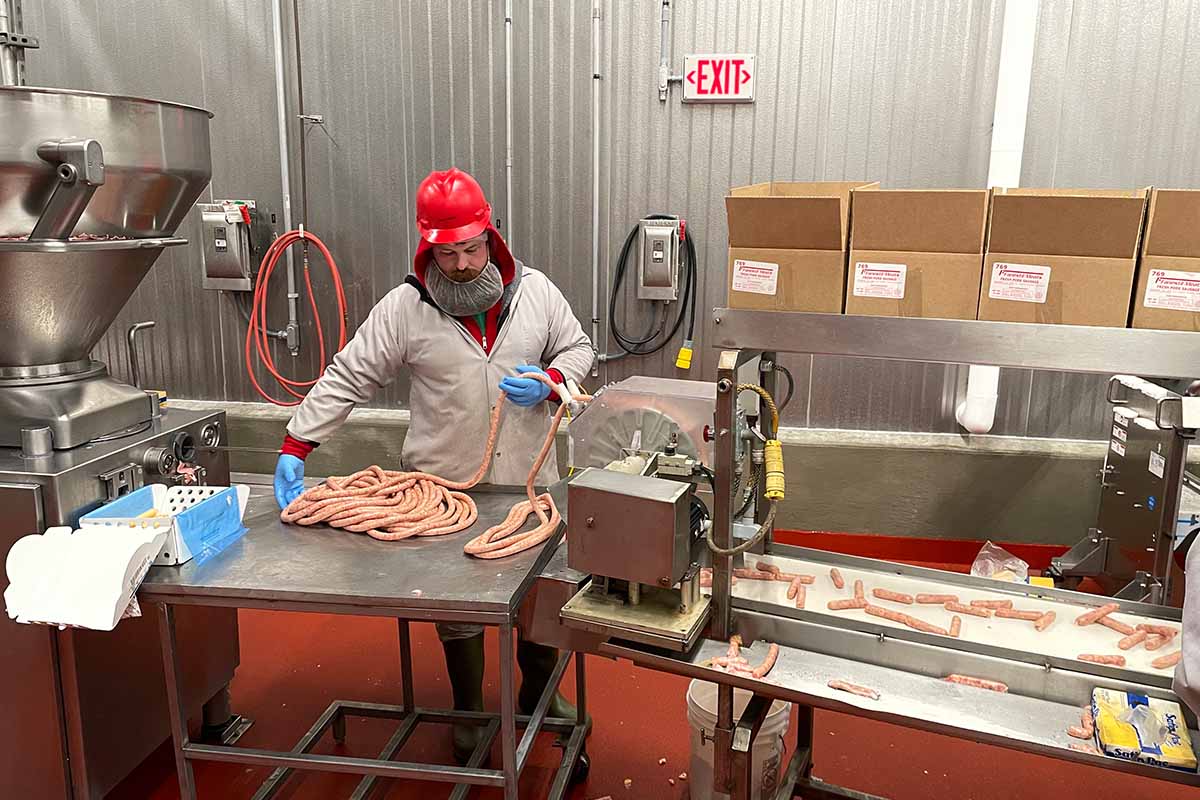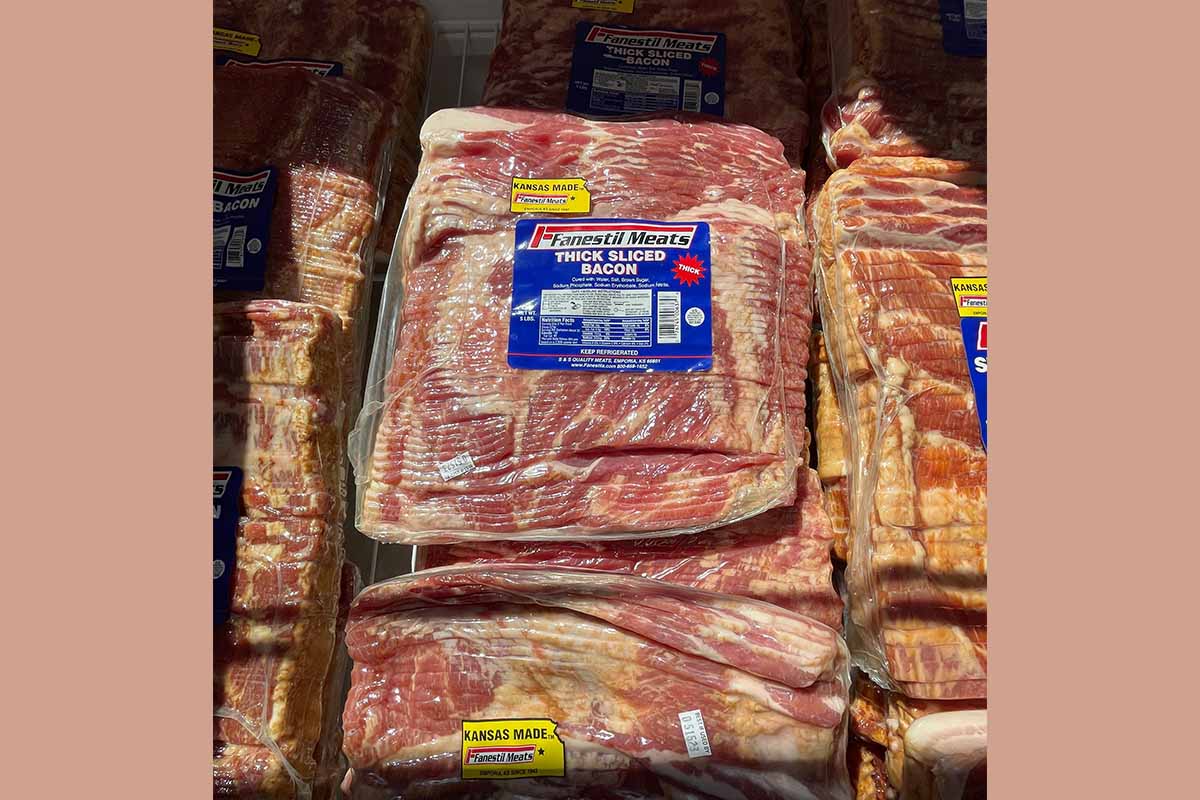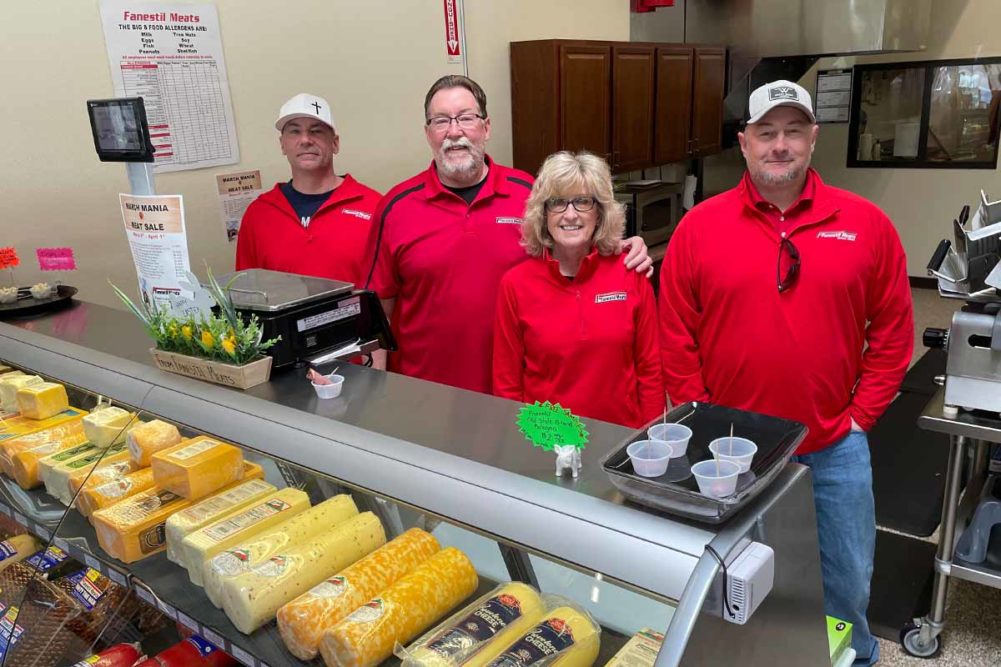After decades of enduring costly and disruptive floods at its original riverfront location, the longtime owners of Emporia, Kan.-based Fanestil Meats have relocated far from the threat of rising water and now are ready to make a big splash after a recent investment in the company’s future. After moving its processing operations into a new building in early 2023, the company not only remedied the flooding issue, but also took the business from over-capacity status to operating at just about 20% of its capacity in the much larger space.
Husband-and-wife Jan and Dan Smoots have owned Fanestil since 2005, after the couple bought out Dan’s business partner who purchased the plant with him in 1997. At that time, Fanestil Meats was still located where it was founded in 1942, near the bank of the Cottonwood River, just south of Emporia. The plant had an unenviable reputation for flooding several times a year when the river spilled over its banks.
Over the years, the company earned a reputation as a locally legendary processor of ready-to-eat, fresh and smoked and cooked, value-added meats for local and regional retail customers. Its trucks deliver to customers in a radius of approximately 100 miles. The fleet includes nine refrigerated trucks, most of which are on the road making deliveries every day, while some customers pick up their products at the plant in their own trucks.
Dan Smoots, a graduate of Emporia State University, was no stranger to the meat business, having worked at the IBP plant on the sanitation shift in Emporia part-time, beginning in 1972 and throughout college. He continued working in production at IBP on a part-time basis even after he graduated with an education degree and began teaching school. About five years into teaching, IBP offered him a full-time job in HR in Boise, Idaho, which he took. The job included several transfers to other IBP plants in several states, eventually leading Smoots back to Emporia in the mid-1980s, working in the plant where it all started. It was then that a co-worker bought Fanestil Meats and asked Smoots to work in an HR role on a part-time consulting basis, which he even did for years remotely, during another IBP job transfer and later, a job change that landed him in McLouth, Kan., in 1989. Incidentally, it was in McLouth where he met his wife-to-be, Jan. About five years later, he found out his friend was ready to sell Fanestil Meats. During the search for a new owner, it occurred to Smoots: “What if I was interested in buying it?”
Smoots contacted another friend about the prospect of co-owning the company and the two acquired the facility in 1997. That partnership lasted until 2005, when Smoots and his wife bought out the partner. As part of the transition, Jan took over the former partner’s role overseeing quality control and helping with labeling issues, audits and behind the scenes details while Dan led the day-to-day business operations.
Once the new owners were up and running for a few years, the Smoots’ two sons, Joe and Nate, joined the business in about 2011 and 2013, respectively. Older brother, Joe, works as the production manager while Nate oversees shipping and logistics in addition to working on the sales side of the business. It’s no accident that Dan, who is 69, and Jan at 73, are positioning the company for success for the next generations of their family.
The Smoots’ granddaughter, who is 22, is planning to join the company to lead development of its e-commerce business and gradually take over some of Jan’s duties as she slowly transitions into retirement.
 Source: Joel Crews/Sosland Publishing Company
Source: Joel Crews/Sosland Publishing Company
Heading to Drier ground
Realizing the original location wasn’t sustainable for future growth, the couple began the process of moving, investing in a location situated on 70 acres in 2015. The first phase of construction spanned 23,000 square feet just off Highway 50, far from rising water and close to Interstate 35. It included a warehouse to relieve the space shortage at the original plant in addition to an office space and a retail store. Meanwhile, processing continued at the flood-prone plant until a 47,000-square-foot production space was added to the new facility and processing there began about seven months ago. Moving the processing operations was a harrowing process, Smoots said, especially because the company transitioned from operating out of the old plant to the new one in one week. Fortunately, the company had the benefit of utilizing its 100 employees to help with the move and was able to use its delivery trucks to move most of the contents of the old building.
“It was a coordinated effort that we worked on for a long time,” Dan Smoots said, adding that working on two startups during the early part of his career helped him plan for the transition. “Prior planning and preparation really were the key, and it prevented a lot of problems,” he added.
The new processing plant was equipped with a mixture of new technology and equipment from the old facility. Dan said the company invested in plenty of new equipment, which was installed before the move was made, including two new smokehouses and large refrigeration systems.
He said as much as 60% of the equipment used at the old facility was moved to the new plant. Years ahead of the move, the Smoots would invest in processing technology knowing that it would ultimately be moved to a bigger, state-of-the-art plant and the installation at the original plant was intentionally short term. Today it’s equipped with new Marlen smokehouses, a mammoth Laska bowl chopper, a Handtmann stuffer, a Multivac tray sealer and Hoegger bacon pressing technology, with more equipment to come, including delivery of a Laska Super Grinder, which was expected to be installed soon, with plenty of room to spare in the new processing facility.
At the new plant, Smoots said Fanestil is primed and ready to aggressively ramp up production in three categories: hot dog and sausage; bacon and ground meats.
“In each of those categories we can easily do a truckload a week of additional production,” Smoots said.
Fanestil is proud of its reputation for producing what Smoots said are the best hot dogs and bacon in this part of the country. The company is perhaps best known for its deli-style, Party Time Ham, Turkey, Chicken, Roast Beef and Pastrami. The regionally famous, sous-vide-cooked ham has been a Fanestil signature item for over 60 years. The owners insist that the 98% lean pork delivers a smoky flavor, and it is dipped in a caramel covering to deliver “a party in your mouth.”
Fanestil’s retail store is a showroom for its hundreds of SKUs, including a wide variety of value-added meats, whole muscle cuts, whole hams, ham steaks and locally sourced ingredients as well as a full-service deli that includes an array of cheeses, sliced deli meats, bologna and specialty items like its Luxury Loaf, Macaroni & Cheese Loaf and Baked Beans with Beef. The retail operation also features local suppliers of products such as snacks, honey, jam and jellies, spices and rubs, cheese curds and other specialty items.
A variety of bacon (including Steak Cut, Thick Sliced and Peppered) are sold under the Fanestil brand as are the multiple types of hot dogs, all of which are also produced for private label customers.
Fanestil processes ground product, but only chicken. “The ground is not under our label,” Smoots points out. “We do custom ground chicken, and we do certified organic ground chicken that is certified humane.”
He said ground turkey and ground pork are items the company would consider adding to its portfolio if requested but ground beef processed at the plant is made in-house for retail sales only at their retail store.
“Beef’s a wild card,” he said. “It’s just a little more difficult to do.”
The company does sell ground beef and patties made by other supplier partners. Raw material suppliers to Fanestil include industry mainstays like Cargill, Tyson and Seaboard, in addition to some specialty processors including Certified Piedmontese.
Besides sales at its on-site retail store and distribution to regional grocery store chains and independent stores, using its delivery trucks, Fanestil Meats Food Service supplies restaurants, schools, hospitals, hotels, casinos and other institutional and hospitality-based customers through agreements with its Midwest wholesaler partners. Its products are also featured at local wineries and smaller, independent grocers. State and county fairs and festivals and carnivals in the region are also customers of Fanestil’s, which can supply them with hot dogs, bratwursts, turkey legs and other festive foods. The holiday season is always a big windfall for the company, especially orders for hams from companies for their employees, several of which include orders of 1,500-plus hams. Gift boxes are also in high demand during the holidays, with orders coming from tens of thousands of product brochures.
“Our real claim to fame is our deli meats,” Smoots said. “That’s where our real expertise lies.”
 In its recently opened plant, bacon is one product category Fanestil Meats expect to grow substantially. (Source: Joel Crews/Sosland Publishing Company)
In its recently opened plant, bacon is one product category Fanestil Meats expect to grow substantially. (Source: Joel Crews/Sosland Publishing Company)
Into the future
As for the growth opportunities, the strategy is to focus on blowing up the capacity of hot dogs and sausages, bacon and ground products, and with a much larger plant, Fanestil is equipped and ready to take on that additional production. Meanwhile, the next area of focus in the now-bigger plant is on the packaging area, where there is a box shop that is not yet being used and plenty of space for more equipment. Eventually there will also need to be more freezer space added with plenty of space available to accommodate it.
With a long history as a small batch processor, Fanestil can now increase production much more as their customers grow.
“We’re a niche-type producer, so we can do 3,000 to 5,000 lbs of a product or 10,000 lbs, whereas most companies don’t want to even talk to somebody at that level,” Smoots said. He is proud that the company can serve as an incubator for startups and grow with them.
Smoots admits that Fanestil has never aspired to be the lowest-cost processor in the industry, competing with other premium value-added processors.
“We work with margin in mind,” he said with an emphasis on high quality, efficiency and volume.
That said, he admits the company’s internet sales are lacking and there is a big opportunity for growth in that part of the business.
“We have a granddaughter that’s coming on board and we’re hoping that we can turn that over to her,” he said. “It’s just not been our focus. Our focus has been to get out of the floodplain; to build a new plant and to open up the doors and be able to run like we know we can. We’ve got our foot on the top of the accelerator and we’re ready to push the accelerator down now.”
The Smoots have built it and now they are bracing for the additional business that is sure to come. The new plant is equipped with nine processing lines, but currently Fanestil only needs to operate three of them, operating on a part-time basis as the plant is only processing four to five days per week. The plant is built to accommodate four smokehouses but only operates two currently, with one more that is sitting nearby but not yet installed due to the unrealized demand that the Smoots are sure will grow. All the pieces are in place, according to Smoots, who anticipates sales to double or triple in the next five years.
He compared the new plant to a hot rod, revving its motor at the starting line, raring to go.
“We’re really ready to pounce,” Smoots said.



